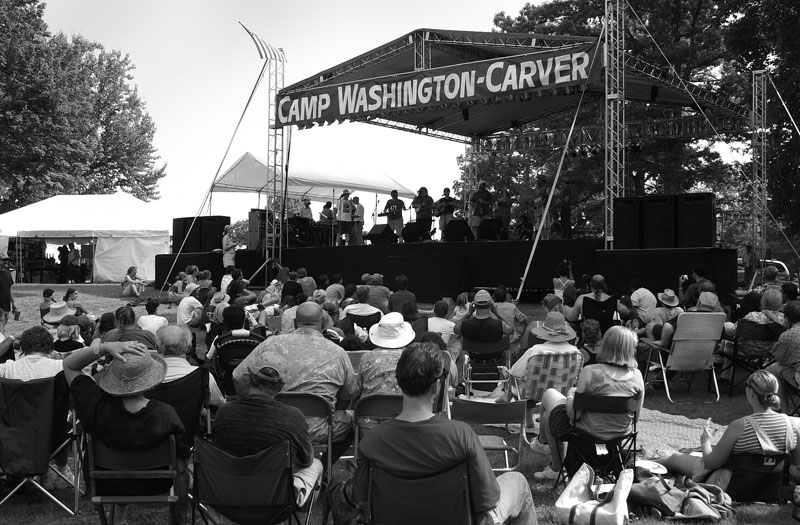Open Arms at Clifftop
Appalachian String Band Music Festival at 20
By John Lilly
Photographs by Michael Keller

A crowd gathers for the 2002 Appalachian String Band Music Festival at
Clifftop, Fayette County. Photograph by Michael Keller.
“Though historically rooted in rural hills and hollows, string band music now enjoys a vitality and community that extends far beyond the Appalachian mountains. The [Appalachian String Band Music] Festival is an open-armed celebration – please join us!”
With these words on the first festival flyer in 1990, the West Virginia Department of Arts, Culture and History rolled out the welcome mat to musicians and music lovers of all backgrounds and invited them to join in a new adventure. Over the past 20 years, tens of thousands of musical pilgrims have found their way to a remote mountaintop in Fayette County and helped to create a unique event – one that combines tradition and eccentricity, rural roots and urban branches, heritage and innovation.
The Appalachian String Band Music Festival was the brainchild of Charleston musician and organizer Will Carter. In the mid-1980's, Will was playing in a local band called the Green Meadow String Band, with fiddler Bobby Taylor, banjo player Mark Payne, guitarist Tom King, and Will on bass. Having just finished law school in New York City and having attended college in Boston, Will was acquainted with string band musicians from the East Coast, whose approaches to traditional music were anything but traditional.
Since the mid-1970's, Will and his friends had been traveling to southern fiddlers conventions, including popular events held annually at Galax, Virginia, and at Mount Airy, North Carolina. While enjoyable and inspiring, they couldn’t help but notice that these festivals tended to emphasize time-honored local traditions, with the contest prizes going mostly to local musicians. These festivals were also held in city or county parks, located near the downtown areas of these bustling mill towns.
In Will’s own experience, musical traditions were traded freely and without much regard for the boundaries that sometimes exist between musicians. “I played for several years without even being aware of the distinction between bluegrass and old-time or mountain music or fiddle music,” he says. “It was just what we played.”
Though he eventually came to realize the differences between various styles of music, Will began to envision an event that would embrace a wide range of influences and one that would be held in a wooded, pastoral setting.
Several years earlier, the Department of Arts, Culture and History had hosted the Appalachian Open Championship, a high-dollar, highly competitive bluegrass music contest, held at Camp Washington Carver, located near the town of Clifftop, in Fayette County. Clifftop, an old mining town established in 1884, was by then a quiet cluster of homes and closed-down buildings, situated along the old Midland Trail, about 20 miles southeast of Fayetteville.
Camp Washington Carver was the nation’s first state 4-H camp for African Americans. Dedicated on July 26, 1942, the stately facility was initially managed by West Virginia State College, now West Virginia State University. For the next 21 years, the camp served as a summer camp for as many as 1,600 black West Virginia campers annually. It also functioned as the primary non-school African American center for agriculture, mining, arts, and home economics education in West Virginia. Due to the effects of desegregation, the facility was closed in 1963 and was deeded to the state. [See “Camp Washington Carver: An African American Landmark in Fayette County,” by Norman Jordan; Winter 1999.]
In time, Camp Washington Carver came under control of the Department of Arts, Culture and History, which maintains the facility and uses it to host
various cultural programs and private events.
In the early 1980's, Will Carter had attended the Appalachian Open Championship
at Camp Washington Carver. The event, aimed at attracting top-flight bluegrass
competitors, was expensive to run and proved slow in drawing a substantial
paying audience. By 1987, it was discontinued. Will saw the wooded, 583-acre
site, however, as the ideal location for his dream festival.
You can read the rest of this article in this issue of Goldenseal, available in bookstores, libraries or direct from Goldenseal.